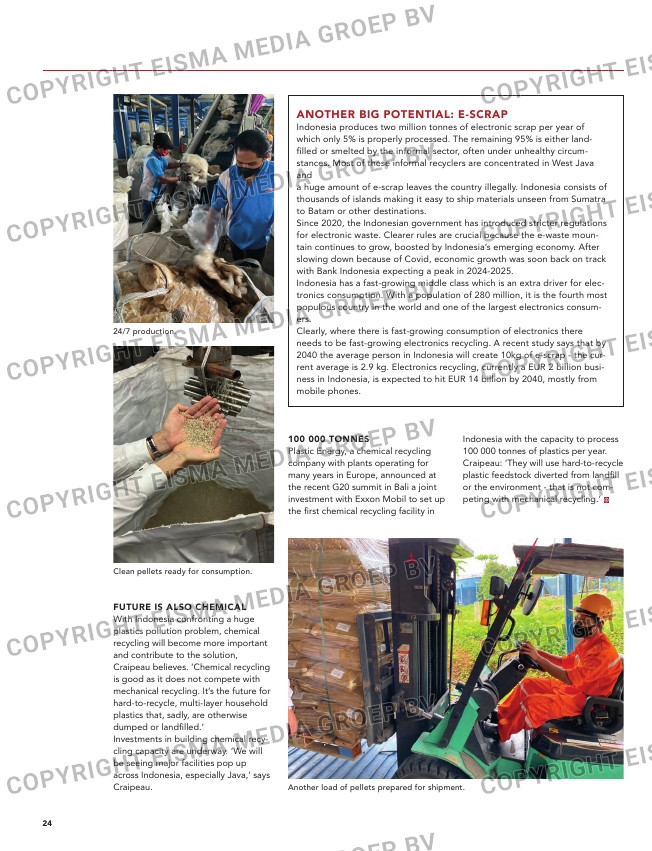Page 24 from: Recycling International – March/April issue 2023

24
FUTURE IS ALSO CHEMICAL
With Indonesia confronting a huge
plastics pollution problem, chemical
recycling will become more important
and contribute to the solution,
Craipeau believes. ‘Chemical recycling
is good as it does not compete with
mechanical recycling. It’s the future for
hard-to-recycle, multi-layer household
plastics that, sadly, are otherwise
dumped or landfilled.’
Investments in building chemical recy-
cling capacity are underway. ‘We will
be seeing major facilities pop up
across Indonesia, especially Java,’ says
Craipeau.
100 000 TONNES
Plastic Energy, a chemical recycling
company with plants operating for
many years in Europe, announced at
the recent G20 summit in Bali a joint
investment with Exxon Mobil to set up
the first chemical recycling facility in
Indonesia with the capacity to process
100 000 tonnes of plastics per year.
Craipeau: ‘They will use hard-to-recycle
plastic feedstock diverted from landfill
or the environment – that is not com-
peting with mechanical recycling.’
ANOTHER BIG POTENTIAL: E-SCRAP
Indonesia produces two million tonnes of electronic scrap per year of
which only 5% is properly processed. The remaining 95% is either land-
filled or smelted by the informal sector, often under unhealthy circum-
stances. Most of these informal recyclers are concentrated in West Java
and
a huge amount of e-scrap leaves the country illegally. Indonesia consists of
thousands of islands making it easy to ship materials unseen from Sumatra
to Batam or other destinations.
Since 2020, the Indonesian government has introduced stricter regulations
for electronic waste. Clearer rules are crucial because the e-waste moun-
tain continues to grow, boosted by Indonesia’s emerging economy. After
slowing down because of Covid, economic growth was soon back on track
with Bank Indonesia expecting a peak in 2024-2025.
Indonesia has a fast-growing middle class which is an extra driver for elec-
tronics consumption. With a population of 280 million, it is the fourth most
populous country in the world and one of the largest electronics consum-
ers.
Clearly, where there is fast-growing consumption of electronics there
needs to be fast-growing electronics recycling. A recent study says that by
2040 the average person in Indonesia will create 10kg of e-scrap – the cur-
rent average is 2.9 kg. Electronics recycling, currently a EUR 2 billion busi-
ness in Indonesia, is expected to hit EUR 14 billion by 2040, mostly from
mobile phones.
Another load of pellets prepared for shipment.
24/7 production.
Clean pellets ready for consumption.
22-23-24_countryreport-deel2.indd 24 15-03-2023 11:42



